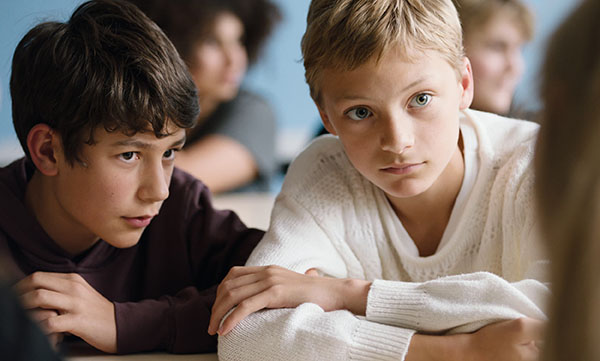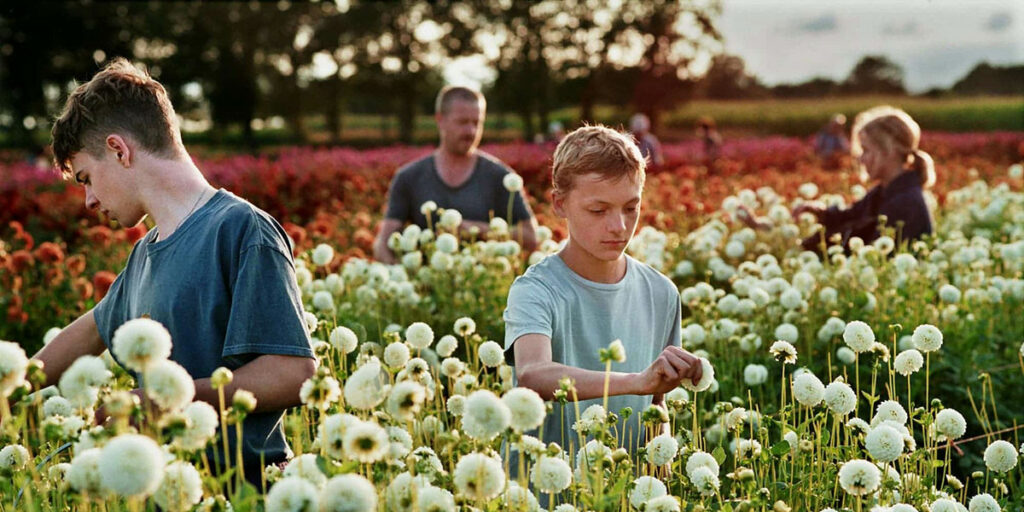In his beautiful, poignant film Close, Lukas Dhont teaches us about love, grief, masculinity and healing through the haunting story of a friendship.
Not long after Lukas Dhont’s (Girl) Close has begun, the film’s titular characters, thirteen-year-old best friends Léo (Eden Dambrine) and Rémi (Gustav De Waele) are hanging out with some classmates at school, and one of the girls sitting in front of them asks them if they’re a couple, giggling and exchanging knowing glances with her own BFF. Léo immediately replies that they aren’t, and the girl asks again. “I’m not being mean: it’s just a question,” she tells him, and he reiterates that they’re simply best friends. But the girl insists, pointing out that Léo and Rémi are so close that no other explanation would be possible. “What about you?,” replies Léo, pointing out that it’s not that different from the way the two girls behave when they’re together, but she still doesn’t understand.
That scene is a key moment in the film, not only because it marks the exact time when our protagonists’ relationship begins to change, but also because it offers us an accurate analysis of assumptions about masculinity that are still deeply-rooted in our society to this day. If two girls are affectionate towards one another, they are best friends, but if two boys are just as close, behaving in the exact same way, they must be a couple. Rémi and Léo are not allowed to show their emotions, be tender towards one another, or simply enjoy each other’s company: they’re supposed to adhere to a very specific ideal of masculinity that sees them play manly sports, be into girls, express themselves physically rather than emotionally, and preserve a cool, detached façade at all times.
And so, just like that, Léo begins to question his entire identity, his childlike innocence forever gone to leave room for a range of feelings that he doesn’t understand, let alone know how to process and externalise. Léo used to spend more time at Rémi’s than at his own house, where the boys would use their imagination to conjure up stories and games during the day, and sleep in the same bed at night, sharing their fears and reveling in each other’s company. But now, the boy is confused. He doesn’t know how to behave in a way that would make him feel accepted by his peers, nor does he understand how to express his feelings, overtaken by doubt and insecurity. And so, he doesn’t. He simply shuts himself off and avoids interactions with Rémi, joining a hockey team and hanging out with other boys instead.

To say anything else about what happens next would be a spoiler, as it’s best if you go into the movie knowing very little about it, letting each new development sink in until the film reaches its resolution, and you’re left with an experience that spoke to your very core. Suffices it to say that, when Léo stops talking to Rémi, Close immediately evolves into a completely different kind of movie. From then on, though it still offers meaningful insight into identity and masculinity, it also becomes about overcoming grief, learning to lean on others, and how letting ourselves feel painful emotions can ultimately help us grow and find ourselves again.
Both the delicate, empathetic tale of a friendship and a shocking, deeply affecting story that will break your heart into a million pieces, Close is a thoroughly absorbing watch with an almost therapeutic effect, and it’s made all the more powerful by its performances and technical achievements. Eden Dambrine and Gustav De Waele’s chemistry is part of the reason why the film works, but so are their individual performances. Both leads effortlessly inhabit their characters, brining us fully fledged human beings that never fail to feel authentic, but Eden Dambrine is undoubtedly the standout here, having to convey the many emotions of a conflicted character often with looks alone, and demanding our attention regardless of whether he’s letting out rage while playing hockey, allowing himself to be affectionate towards Rémi, or even just staying still and processing his feelings. It’s astonishing to think that both Dambrine and De Waele are newcomers, and I’m sure great things are in store for them in the future.
The supporting cast is just as good, with each of Léo and Rémi’s respective family members giving the film more context and meaning. Émilie Dequenne and Léa Drucker shine as Rémi and Léo’s mothers, each with a very specific role to play that adds even more meaning to this story. But the most impressive performance comes from Kevin Janssens, who’s barely in the film as Rémi’s father but who is responsible, alone, for the most emotionally affecting scene of the movie.
Technically speaking, Close is also excellent, boasting a color palette (Laurens Orij) that changes with its characters’ moods, from the gorgeous yellow shades and vibrant shots of nature that define Rémi and Léo’s relationship to the colder look of the school and hockey field, where they’re not allowed to be carefree. The cinematography (Frank van den Eeden) makes the film more immersive, giving us dynamic shots that make the film flow and more intimate close-ups that clue us in as to our characters’ feelings, with handheld camera movements that add empathy to this delicate yet extremely impactful tale. Sound designer Vincent Sinceretti (Pleasure) uses sound, or the lack thereof, to his full advantage, with amplified muffled noises that heighten Léo’s state of mind as well as sudden silences that add gravity to key moments in the movie.
Close is many things at once, and part of the pleasure of watching it lies in the discovery of every single one of these themes. At the end of the movie, Léo happens to break a bone, and he has to wear a cast for a little while. When the cast is removed, the doctor tells him to try to slowly move its wrist, to see if it still hurts, which pretty much sums up what the film is about. Close is ultimately a film about healing. Just like his broken bones, Léo is also beginning to heal by the time the credits roll, and he is definitely stronger because of it. But it’s also a slow, painful journey that ends up shaping him into a completely different person, as he now carries a whole lot of grief and sorrow that he didn’t have before. Which, after all, is what surviving life is all about.
Close premiered at the 2022 BFI London Film Festival on October 8, 2022. The film had a limited release by A24 in November and will be released in US theaters on January 27, 2023, in UK cinemas on March 3, and on MUBI on April 21.

